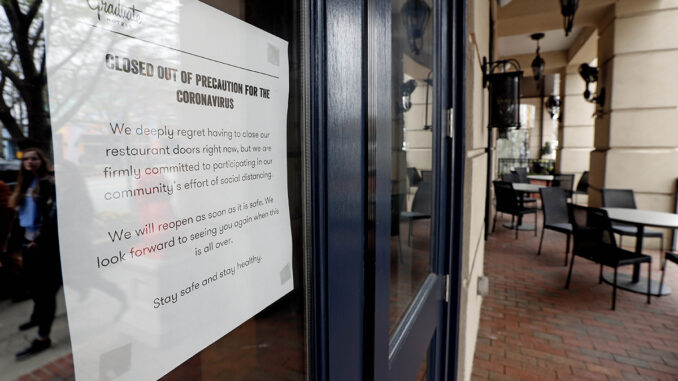
RALEIGH — Two COVID-19-related lawsuits saw movement at the end of May in North Carolina’s top court.
One of the lawsuits involves the North Carolina Tavern and Bar Association suing North Carolina Gov. Roy Cooper over his pandemic business closures.
Lawyers for the governor filed an appeal to the N.C. Supreme Court on May 24 after a unanimous appeals court decision in April that said Cooper’s business shutdowns infringed on tavern and bar owners’ labor and equal protection rights under the state’s constitution.
That appeal was accepted on June 5.
The appeals court ruling remanded the case back to the trial court level. Judge April Wood delivered the appeals court ruling, with Judges Donna Stroud and Jefferson Griffin concurring.
At the heart of the plaintiff’s claims was the differential treatment between certain establishments in two of Cooper’s executive orders — order 118, which closed all bars, and order 141 which allowed only certain bars and restaurants to open but kept private bars closed.
Wood noted that “Defendant relied on ‘science and data’ he claimed created a reasonable basis to distinguish between types of bars, thus letting some reopen while keeping others closed.”
“Our careful review of the Record does not reveal the existence of any scientific evidence demonstrating Plaintiffs’ bars, as opposed to the bars located in other establishments serving alcohol, posed a heightened risk at the time Executive Order No. 141 was issued,” Woods wrote about the evidence offered by Cooper’s attorneys.
Woods’ ruling also rejected a Washington Post article offered as proof, stating, “A news article, however, is not a scientific study nor is it apparent that it was based on a scientific study.”
The appeal argues that during the COVID-19 pandemic, the governor issued executive orders to protect public health that limited the operations of some businesses. While those orders have been lifted, lawsuits remain pending from businesses seeking damages for alleged constitutional violations.
The lawyers for Cooper also argue that claims for damages should fail under precedent that gives latitude to reasonable economic regulations rationally related to proper governmental purposes and that the governor had to make difficult pandemic choices balancing public health and the economy.
Additionally, Cooper’s appeal asserts that the N.C. Court of Appeals erred by suggesting damages may be appropriate.
The other lawsuit, Happel v. Guilford County Board of Education, involves a Guilford County teen who was given a COVID-19 vaccination without parental consent. The student, Tanner Smith, was only supposed to take a COVID-19 test but instead was vaccinated.
The case, brought by Emily Happel on behalf of her son, attracted attention due to the Public Readiness and Emergency Preparedness (PREP) Act, a 2021 state law requiring parental consent before giving minors vaccines under emergency use authorization.
The initial lawsuit alleged Smith was “illegally vaccinated without his or his mother’s consent by the Old North State Medical Society, which was working in conjunction with Guilford County Schools.”
The trial court had ruled the defendants had immunity under the PREP Act.
Wood again penned the N.C. Court of Appeals ruling, upholding the lower court’s decision. She was joined by Judges Allegra Collins and Jeff Carpenter.
“Plaintiffs argue that the PREP Act does not cover their claims because they do not arise because of COVID-19, but merely happen to relate to COVID-19. We would be inclined to agree if the PREP Act did not define the scope of immunity so broadly,” wrote Wood. “Because there does not appear to be any Fourth Circuit or North Carolina federal district cases on point, ONS Medical Society draws our attention to three out-of-state cases.”
Following the appeals court decision, an appeal filing was made to the N.C. Supreme Court by the Happel family’s attorney.
Eight Republican state legislators filed a brief urging the state Supreme Court to take the case to protect parental rights, writing, “This case presents a major question regarding preemption of state constitutional protections for parents’ fundamental liberty interests.”
The school board and Old North State Medical Society asked the court not to take the case.
The N.C. Supreme Court issued an order on May 21 that a discretionary review of the case would only look at one part of the lawsuit: whether or not the trial court and the court of appeals erred in deciding the PREP Act provided defendants immunity from constitutional violations and “pre-empted all state law claims.”
A date for the review has not yet been announced.


